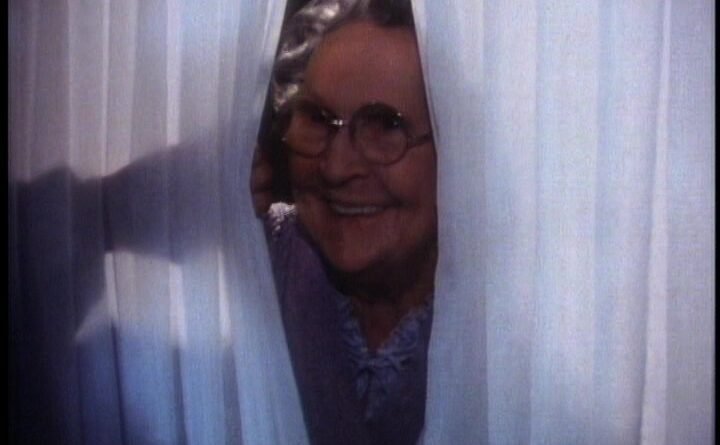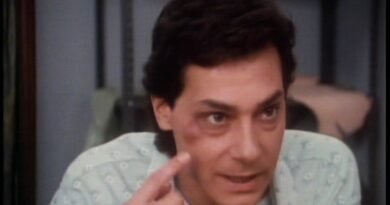Tales from the Darkside: “Slippage” (S1E06)

“Slippage” is one of those Tales from the Darkside episodes that feels quietly unsettling rather than outright scary. It trades in paranoia, identity, and existential dread, wrapped in a Kafkaesque scenario that escalates from strange inconvenience to full-blown metaphysical horror. While not one of the series’ flashiest or most twist-laden episodes, it succeeds as a low-key psychological thriller that poses the question: what if reality simply… forgot you existed?
Plot Summary
Richard Hall is a graphic designer with a stable life: a loving wife, a steady job, and a generally contented demeanour. But things begin to slip—literally. He starts receiving rejection letters for jobs he never applied for. His job interviews disappear from calendars. His paycheck goes missing. Eventually, his employer claims they never hired him.
It doesn’t stop there. Friends begin forgetting him. His school records vanish. Even his mother appears uncertain about his existence. Only his wife Elaine still remembers who he is, and she grows increasingly distressed as reality continues to erase Richard from every corner.
Desperate for answers, Richard spirals into paranoia. He visits his childhood friend Wayne, now institutionalised, who mutters cryptically about people “slipping”—falling through the cracks of reality. Wayne suggests it’s part of a cosmic correction, where people not meant to be here get edited out.
In the final scene, Elaine wakes up alone. Richard is gone. No trace of him remains. The last sign of his existence is a name carved into a tree in the woods, fading slowly, like a dream no one can remember.
What Works
Slow-Burn Dread
“Slippage” builds tension patiently, escalating Richard’s disappearances from minor to existential. The early frustrations (a missing paycheck, a forgotten interview) are relatable, which makes the later unraveling more impactful. It creeps up on you rather than jumping out, and that psychological angle gives it power.
Strong Central Performance
David Patrick Kelly as Richard Hall brings an everyman vulnerability to the role. Best known for his eccentric or villainous parts (like in The Warriors), here he plays it grounded, relatable, and increasingly frantic. His performance carries the episode.
Minimalist Sci-Fi Horror
The premise—being erased from reality—isn’t new, but it’s executed here with economy and style. There’s no need for elaborate special effects; the horror comes from the reaction of people around Richard and his own growing disbelief. It feels like an Outer Limits or Twilight Zone story, with that signature 1980s Darkside atmosphere.
Existential Themes
What does it mean to exist? Is our reality dependent on others remembering us? “Slippage” plays with these questions without over-explaining or dipping into heavy philosophy. It trusts the viewer to feel the horror of being forgotten.
What Doesn’t Work
Pacing Issues
Some viewers might find the episode a bit slow. It takes a while for the stakes to escalate, and the payoff, while chilling, is understated. The ambiguity of the ending may also frustrate those wanting a clearer resolution.
Supporting Characters Lack Depth
Elaine is mostly reactive, and her character feels a bit underdeveloped. Aside from Richard and Wayne, no one really has a strong presence. This isn’t a huge issue given the tight focus, but a bit more emotional range from the supporting cast could have added richness.
Missing an Emotional Climax
When Richard finally vanishes, the emotional impact feels slightly muted. A final confrontation, a moment of catharsis, or even a stronger sense of cosmic horror might have elevated the finale. Instead, it fades away quietly—perhaps too quietly.
Themes: Identity, Memory, and Existential Erasure
At its core, “Slippage” is a story about identity being tethered to others’ perceptions. Richard isn’t just disappearing physically—he’s being deleted from collective memory. It’s a terrifying idea: the thought that existence isn’t concrete, but something granted by social validation and institutional record.
It also touches on fate and the idea of reality as a controlled system. Wayne’s ramblings hint at a cosmic bureaucracy, one that sometimes corrects mistakes by erasing people who weren’t “supposed” to be here. It’s a scary, fascinating, and unexplained idea that lingers.
Final Thoughts: A Quiet Tragedy with a Chilling Premise
“Slippage” may not deliver shocks or gore, but it stays with you. It’s an elegant, eerie parable about the fragility of selfhood in a world that defines us through connection. If you’ve ever felt lost in the shuffle of bureaucracy or like you were fading from people’s lives, this episode hits a raw nerve.
It doesn’t wrap things up with a bow, nor does it offer a villain to blame. The horror is faceless and unyielding, which makes it feel more real. And sometimes, that kind of horror is the most unsettling of all.
Who Would Enjoy This Episode?
- Fans of psychological horror and existential dread
- Viewers who appreciate ambiguous, slow-burn storytelling
- Anyone who enjoys Kafkaesque narratives or Twilight Zone-style moral fables
Who Might Not Enjoy It?
- Those looking for action, monsters, or gore
- Viewers who prefer tidy, clearly explained endings
- Anyone who finds slow pacing a dealbreaker
Final Verdict: A Subtle and Unsettling Slide into Oblivion
With a haunting concept and a strong lead performance, “Slippage” is one of the more quietly powerful episodes of Tales from the Darkside. It may not shout, but it whispers something you won’t easily forget.




